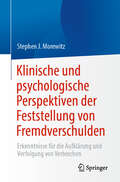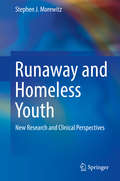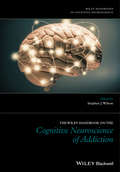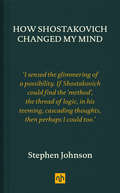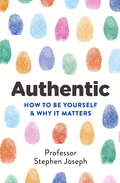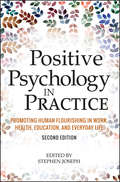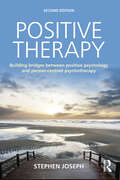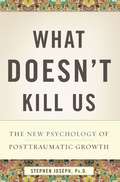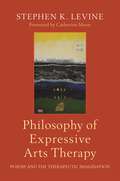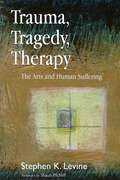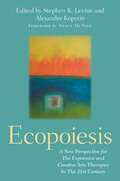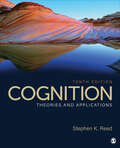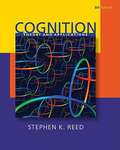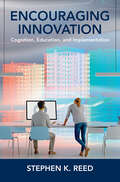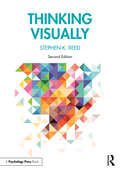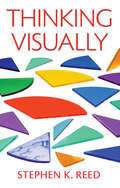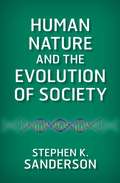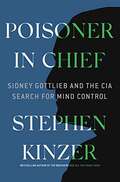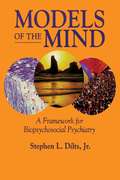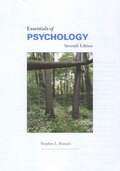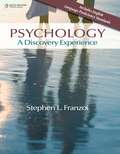- Table View
- List View
Klinische und psychologische Perspektiven des Foulspiels
by Stephen J. MorewitzDieses Buch untersucht ein breites Spektrum von Faktoren, die Einfluss darauf haben können, wie die Polizei das Fremdverschulden in möglichen Mordfällen und bei anderen möglichen Verbrechen feststellt. Es wird eine neue Theorie der Unsicherheit auf der Mikro-, Meso- und Makroebene entwickelt, um zu erklären, wie Juristen zu dieser Entscheidung gelangen. Insbesondere wird untersucht, inwieweit die Unsicherheit in diesen Situationen durch die Medienberichterstattung, den Druck der Familie und der Gemeinschaft, sozioökonomische Faktoren, demografische Elemente der Opfer sowie das Wissen und die Ressourcen der Polizei beeinflusst werden kann. Dieses Buch beschreibt, wie forensische Fachleute die Strafverfolgungsbehörden in Fragen wie der Inszenierung von Tatorten zur Verschleierung des Vorsatzes, der Einleitung von Gemeinschaftsstrategien zur Suche nach vermissten Personen und der Zuverlässigkeit von Verhaltensprofilen beraten können. Die neuesten Forschungsergebnisse aus dem Foul Play Project und dem Missing Persons Project werden herangezogen, um die Empfehlungen in diesem Buch zu untermauern und den Weg für weitere Forschungen in diesem Bereich zu weisen.
Runaway and Homeless Youth
by Stephen J. MorewitzThis straightforward reference surveys the knowledge base on homeless, runaway, and thrown-away children and adolescents and makes concrete recommendations for policy and practice. It is a comprehensive volume, that covers new state legislation in the U. S. dealing with runaway and homeless youth. The book's ecological approach grounds readers in the demographics of this diverse population, family and other risk factors for leaving home (and alternative arrangements such as foster care), and the survival skills homeless young people use to sustain themselves. Chapters cover a gamut of physical, psychological, and social problems, from drug abuse to depression to STIs, with special attention paid to the multiple difficulties faced by LGBT street youth and street youths' experiences with the legal and justice systems. The author also assesses established and emerging interventions used with runaway youth, and the effectiveness of policy initiatives dealing with improving conditions for youth on the streets and at risk. Included in the coverage: · Runaway youth at the time of their disappearance. · Food insecurity and related problems among homeless and runaway youth. · Substance use among homeless and runaway adolescents. · Runaway and homeless sexual minorities. · Court responses to runaway offenses and other juvenile status violations. · Street youth in different countries. Presenting the complex situation as it stands, and with clear suggestions for action, Runaway and Homeless Youth is a valuable resource for family therapists, sociologists, social workers, school administrators, health professionals, police, judges, and other criminal justice professional, along with professionals involved in young people's well-being and policy-making initiatives.
The Wiley Handbook on the Cognitive Neuroscience of Addiction
by Stephen J. WilsonThis volume provides a thorough and up-to-date synthesis of the expansive and highly influential literature from the last 30 years by bringing together contributions from leading authorities in the field, with emphasis placed on the most commonly investigated drugs of abuse. Emphasises the most commonly investigated drugs of abuse, including alcohol, cocaine, nicotine, and opiates Brings together the work of the leading authorities in all major areas of the field Provides novel coverage of cutting-edge methods for using cognitive neuroscience to advance the treatment of addiction, including real-time neurofeedback and brain stimulation methods Includes new material on emerging themes and future directions in the use of cognitive neuroscience to advance addiction science
How Shostakovich Changed My Mind
by Stephen JohnsonA powerful look at the extraordinary healing effect of music on sufferers of mental illness, including author Stephen Johnson's struggle with bipolar disorder.BBC music broadcaster Stephen Johnson explores the power of Shostakovich’s music during Stalin’s reign of terror, and writes of the extraordinary healing effect of music on sufferers of mental illness. Johnson looks at neurological, psychotherapeutic and philosophical findings, and reflects on his own experience, where he believes Shostakovich’s music helped him survive the trials and assaults of bipolar disorder.There is no escapism, no false consolation in Shostakovich’s greatest music: this is some of the darkest, saddest, at times bitterest music ever composed. So why do so many feel grateful to Shostakovich for having created it—not just Russians, but westerners like Stephen Johnson, brought up in a very different, far safer kind of society? The book includes interviews with the members of the orchestra who performed Shostakovich’s Leningrad Symphony during the siege of that city.
Authentic: How to be yourself and why it matters
by Stephen JosephThe hunger for authenticity guides us throughout our lives. People strive for joined-up living, where on the one hand what they say and do reflects what they think and feel, and on the other what they think and feel reflects who they are.Stephen Joseph has pioneered developments in research into authenticity, drawing on the solid science of positive psychology to develop what has become one of the gold-standard tests for assessing authenticity. His and others' findings reveal that when people are in relationships in which they feel accepted, understood and valued, they drop their defences. They naturally begin to examine themselves psychologically, accommodate new information and live more authentically. What's more, the latest studies reveal that it is authenticity that leads to true happiness.In Authentic, Stephen Joseph presents his fresh and inspiring perspective on the psychology of authenticity alongside practical advice and exercises for the reader. Drawing on the wisdom of existential philosophers, the insights and research of psychologists, and case studies from his own and others' clinical experiences, he shows how authenticity is the foundation of human flourishing - as well as how the ideas relate to debates about the importance of happiness.
Positive Psychology in Practice
by Stephen JosephThe best minds in positive psychology survey the state of the field Positive Psychology in Practice, Second Edition moves beyond the theoretical to show how positive psychology is being used in real-world settings, and the new directions emerging in the field. An international team of contributors representing the best and brightest in the discipline review the latest research, discuss how the findings are being used in practice, explore new ideas for application, and discuss focus points for future research. This updated edition contains new chapters that explore the intersection between positive psychology and humanistic psychology, salugenesis, hedonism, and eudaimonism, and more, with deep discussion of how the field is integrating with the new areas of self-help, life coaching, social work, rehabilitation psychology, and recovery-oriented service systems. This book explores the challenges and opportunities in the field, providing readers with the latest research and consensus on practical application. Get up to date on the latest research and practice findings Integrate positive psychology into assessments, life coaching, and other therapies Learn how positive psychology is being used in schools Explore possible directions for new research to push the field forward Positive psychology is being used in areas as diverse as clinical, counseling, forensic, health, educational, and industrial/organizational settings, in a wide variety of interventions and applications. Psychologists and other mental health professionals who want to promote human flourishing and well-being will find the second edition of Positive Psychology in Practice to be an informative, comprehensive guide.
Positive Therapy: Building bridges between positive psychology and person-centred psychotherapy
by Stephen JosephThe applications of positive psychology are different from traditional interventions in therapy in that they are focused on building strength, resilience and well-being rather than being restricted to simply treating disorder. Since the publication of the first edition of Positive Therapy, there is now a comprehensive body of applied positive psychology research to which practitioners may turn in order to inform their own practice, and that sees its purpose as the facilitation of human flourishing and optimal functioning. However, much of this research and its implications are only now becoming more widely understood in counselling and psychotherapy. This new and expanded edition of Positive Therapy shows how the latest thinking in positive psychology can be applied to psychotherapeutic practice, and specifically to person-centred therapy. Making the links between positive psychology and psychotherapy explicit, Stephen Joseph describes the new tools that practitioners can draw upon to help and facilitate positive functioning in their clients. New material includes: An update of the latest positive psychology research A new preface, explaining how positive psychology principles can now be applied to therapeutic practice Focus on positive psychology measurement tools Positive Therapy will be essential reading for all psychotherapists, counsellors, social workers, coaches, psychologists and trainees interested in exploring how they engage with clients, and the implications of this engagement in practice.
What Doesn't Kill Us: The New Psychology of Posttraumatic Growth
by Stephen JosephFor the past twenty years, pioneering psychologist Stephen Joseph has worked with survivors of trauma. His studies have yielded a startling discovery: that a wide range of traumatic events-from illness, divorce, separation, assault, and bereavement to accidents, natural disasters, and terrorism-can act as catalysts for positive change. Boldly challenging the conventional wisdom about trauma and its aftermath, Joseph demonstrates that rather than ruining one’s life, a traumatic event can actually improve it. Drawing on the wisdom of ancient philosophers, the insights of evolutionary biologists, and the optimism of positive psychologists,What Doesn’t Kill Usreveals how all of us can navigate change and adversity- traumatic or otherwise-to find new meaning, purpose, and direction in life.
Philosophy of Expressive Arts Therapy: Poiesis and the Therapeutic Imagination
by Stephen K. LevineLaying the philosophical foundations of expressive arts therapy, this book highlights the role and importance of poiesis, the art of 'making' as a response to the world, in the expressive arts therapies as well as our own lives. The concept of poiesis was originally developed and brought into the field by Stephen K. Levine. It is a perspective that restores the primacy of the arts for the arts therapies instead of reducing art-making and art-objects to psychological data. Bringing together different schools of thought in unexpected ways, this book shows how the principles underlying expressive arts therapy have relevance to ethics, politics and social change. It includes chapters on Taoism, improvisation in the arts, and the importance of creativity for understanding human existence. With personal narratives and poetry to help create natural points for the reader to stop and reflect, Philosophy of Expressive Arts Therapy is the perfect guide for those wanting to understand the role of the arts and art-making in life and in therapeutic change.
Trauma, Tragedy, Therapy
by Stephen K. LevineStephen K. Levine's new book explores the nature of traumatic experience and the therapeutic role of the arts and arts therapies in responding to it. It suggests that by re-imagining painful and tragic experiences through art-making, we may release their fixity and negative hold on our lives and resist the temptation to assume the role of the victim. Among the many concerns that the book addresses is the damage done by the tendency to adopt stock methods of understanding and superficial explanations for the depths, complexities, wonders, and exasperations of human experience. The book explores the chaos and fragmentation inherent in both art and human existence and the ways in which memory and imagination can find meaning by acknowledging this chaos and embodying it in appropriate forms. The book builds on the important theories of Stephen K. Levine's previous book, Poiesis: The Language of Psychology and the Speech of the Soul, also published by Jessica Kingsley Publishers. It challenges dominant psychological perspectives on trauma and provides a new framework for arts therapists, psychotherapists, psychologists and social scientists to understand the effectiveness of the arts therapies in responding to human suffering.
Ecopoiesis: A New Perspective for The Expressive and Creative Arts Therapies In The 21st Century
by Stephen K. Levine and Alexander KopytinThis book emphasises ecological, nature-assisted expressive and creative arts and art therapies within the context of the current ecological crises. Rich in fresh theoretical perspectives, this timely compendium of theory, research, and practice also provides methods and tools that can help the reader understand and incorporate new eco perspectives into their work.Building on the concept of poiesis as the human creative function, this book seeks to stress the importance of humanity's ecopoietic capacity, creating a more sustainable life for humans. It has been specifically created within the context of this most critical period of human existence, and acts as a forum for innovation based on the values of the environmental movement and its desire to address the extensive sociopsychological impact of the ecological crisis.
Cognition: Theories and Applications
by Stephen K. ReedNow published by SAGE! A classic text for the undergraduate Cognitive Psychology course, Cognition: Theories and Applications provides an overview of the origins of this experimental field and makes connections with our current understanding of cognitive processes through deep dives into classic and current research findings. Author Stephen K. Reed offers streamlined coverage of classic and contemporary theories, an emphasis on real world applications, and an easy-to-follow explanatory style that demonstrates how cognitive processes are connected. This fully-revised Tenth Edition includes a new, standalone chapter dedicated to Action; full-color visuals; and new research findings in the areas of cognitive neuroscience, linguistics, and robotics. This title is accompanied by a complete teaching and learning package.
Cognition: Theories and Applications
by Stephen K. ReedNow published by SAGE! A classic text for the undergraduate Cognitive Psychology course, Cognition: Theories and Applications provides an overview of the origins of this experimental field and makes connections with our current understanding of cognitive processes through deep dives into classic and current research findings. Author Stephen K. Reed offers streamlined coverage of classic and contemporary theories, an emphasis on real world applications, and an easy-to-follow explanatory style that demonstrates how cognitive processes are connected. This fully-revised Tenth Edition includes a new, standalone chapter dedicated to Action; full-color visuals; and new research findings in the areas of cognitive neuroscience, linguistics, and robotics. This title is accompanied by a complete teaching and learning package.
Cognition: Theory and Applications (8th edition)
by Stephen K. ReedAimed at college undergraduates, this text offers a clear and comprehensive overview of the rapidly evolving field of cognition. Reed (psychology, San Diego State U. ) shows the direct relevance of cognitive psychology to daily activities and the impact of cognitive theories on other fields of psychology. This seventh edition includes new material on current topics such as experience-based versus theory- based judgments of retention, Barsalou's perceptual symbols theory, Kintsch's construction-integration model of text comprehension, and decision frames for risk dimensions. The text has a companion online lab and study guide.
Encouraging Innovation: Cognition, Education, and Implementation
by Stephen K. Reed'Encouraging Innovation: Cognition, Education, and Implementation' is of interest to people who desire to become more innovative in their daily lives and careers. Part I discusses the cognitive and social skills required for innovation – reasoning, problem solving, creativity, group decision making, and collaborative problem solving. The second part discusses education – the development of cognitive skills and talent, application of relevant learning theories, methods and curricula for enhancing creativity, creativity across disciplines, and design education. Part III discusses the implementation of these skills in society – the transition from theory to practice, business innovation, social innovation, and organizational support. Whereas business innovation is related to commercialization, market demands, and profitability, social innovation addresses fulfilling social needs and public demands. Organizational support for innovation occurs at international, national, agency, and regional levels.
Thinking Visually
by Stephen K. ReedThinking Visually documents the many ways pictures, visual images, and spatial metaphors influence our thinking. The book discusses recent empirical, theoretical, and applied contributions that support the view that visual thinking occurs not only where we expect to find it, but also where we do not. Much of comprehending language, for instance, depends on visual simulations of words or on spatial metaphors that provide a foundation for conceptual understanding. This edition has been fully updated throughout and features new coverage of a range of topical and fascinating areas of research, including aesthetics, visual narratives, communicating health risks, dreams, clinical imagery, mathematical games, and the influence of action on perception. It also features a new chapter on Mixed Reality to showcase the many exciting developments in this area. The broad coverage, colorful figures, and research discoveries provide a solid foundation for understanding visual thinking across a wide spectrum of activities. It will be an essential read for all students and researchers interested in Visual Thinking.
Thinking Visually
by Stephen K. ReedLanguage is a marvelous tool for communication, but it is greatly overrated as a tool for thought. This volume documents the many ways pictures, visual images, and spatial metaphors influence our thinking. It discusses both classic and recent research that support the view that visual thinking occurs not only where we expect to find it, but also where we do not. Much of comprehending language, for instance, depends on visual simulations of words or on spatial metaphors that provide a foundation for conceptual understanding. Thinking Visually supports comprehension by reducing jargon and by providing many illustrations, educational applications, and problems for readers to solve. It provides a broad overview of topics that range from the visual images formed by babies to acting classes designed for the elderly, from visual diagrams created by children to visual diagrams created by psychologists, from producing and manipulating images to viewing animations. The final chapters discuss examples of instructional software and argue that the lack of such software in classrooms undermines the opportunity to develop visual thinking. The book includes the Animation Tutor™ DVD to illustrate the application of research on visual thinking to improve mathematical reasoning.
Human Nature and the Evolution of Society
by Stephen K. SandersonIf evolution has changed humans physically, has it also affected human behavior? Drawing on evolutionary psychology, sociobiology, and human behavioral ecology, Human Nature and the Evolution of Society explores the evolutionary dynamics underlying social life. In this introduction to human behavior and the organization of social life, Stephen K. Sanderson discusses traditional subjects like mating behavior, kinship, parenthood, status-seeking, and violence, as well as important topics seldom included in books of this type, especially gender, economies, politics, foodways, race and ethnicity, and the arts. Examples and research on a wide range of human societies, both industrial and nonindustrial, are integrated throughout. With chapter summaries of key points, thoughtful discussion questions, and important terms defined within the text, the result is a broad-ranging and comprehensive consideration of human society, thoroughly grounded in an evolutionary perspective.
Poisoner In Chief: Sidney Gottlieb And The Cia Search For Mind Control
by Stephen KinzerThe bestselling author of All the Shah’s Men and The Brothers tells the astonishing story of the man who oversaw the CIA’s secret drug and mind-control experiments of the 1950s and ’60s. The visionary chemist Sidney Gottlieb was the CIA’s master magician and gentlehearted torturer―the agency’s “poisoner in chief.” As head of the MK-ULTRA mind control project, he directed brutal experiments at secret prisons on three continents. He made pills, powders, and potions that could kill or maim without a trace―including some intended for Fidel Castro and other foreign leaders. He paid prostitutes to lure clients to CIA-run bordellos, where they were secretly dosed with mind-altering drugs. His experiments spread LSD across the United States, making him a hidden godfather of the 1960s counterculture. For years he was the chief supplier of spy tools used by CIA officers around the world. Stephen Kinzer, author of groundbreaking books about U.S. clandestine operations, draws on new documentary research and original interviews to bring to life one of the most powerful unknown Americans of the twentieth century. Gottlieb’s reckless experiments on “expendable” human subjects destroyed many lives, yet he considered himself deeply spiritual. He lived in a remote cabin without running water, meditated, and rose before dawn to milk his goats. During his twenty-two years at the CIA, Gottlieb worked in the deepest secrecy. Only since his death has it become possible to piece together his astonishing career at the intersection of extreme science and covert action. Poisoner in Chief reveals him as a clandestine conjurer on an epic scale.
Models of the Mind: A Framework for Biopsychosocial Psychiatry
by Stephen L. DiltsMaking sense of such bewildering problems as hallucinations, paranoia, depression, and anxiety seems an incredible challenge, but modern psychiatry is able to bring understanding and change to many of those whose lives are impaired by psychiatric problems. This is not accomplished through the application of one dominant psychological theory, but through the integration of perspectives of many such theories in this diverse field into a befitting approach-the biopsychosocial model.Application of the biopsychosocial model will allow for understanding the patient in biological, psychological, and social terms simultaneously, and provide a holistic picture with multiple strategies for treatment.In this book, the author takes a step back from the assessment to demonstrate to the student methods of the information gathered from the patient into a clinically useful whole, essentially showing exactly how and why the psychiatrist arrives at an intervention.
Essentials of Psychology
by Stephen L. FranzoiEssentials of Psychology encourages students to analyze the scientific journey of discovery in psychology. The text also facilitates a personal journey of discovery and includes more than 20 Self-Discovery questionnaires that ask how the specific text material relates to students’ lives.
Essentials of Psychology Fifth Edition
by Stephen L. FranzoiPsychology involves the "study of the mind." As such, introductory psychology offers you the hope that course material will help you better understand not only other people but also yourself. Seeking such knowledge is a distinguishing feature of young adulthood, and the college experience is specifically designed to foster this quest.
Psychology: A Discovery Experience
by Stephen L. FranzoiNIMAC-sourced textbook <p><p> PSYCHOLOGY: A DISCOVERY EXPERIENCE is designed specifically for high school students and is written to the American Psychological Association (APA) National Standards for High School Psychology. Targets English Language Learners with Essential Question activities that facilitate listening, speaking, reading, and writing skills. Stephen Franzoi's conversational writing style guides students through a journey of self-discovery. Students will learn and apply concepts of psychology to their everyday lives with the latest developments in psychology, fascinating interactive figures, in-text labs, career insights, and an online database of current psychology resources. These tools make this the most relevant and accessible high school psychology program on the market. The comprehensive instructor resource package includes the Instructor Wraparound Edition, Instructor Resource CD, lesson plans, PowerPoint Presentations with embedded interactive figures, ExamView Computerized Test Generator, DVD collection, and an online database of current psychology resources.
Understanding General Deterrence
by Stephen L. QuackenbushThis book bridges the divide between formal and quantitative studies of deterrence by empirically testing and extending perfect deterrence theory. The author focuses on general deterrence, which relates to managing relations between states at all times, not only during crises.
